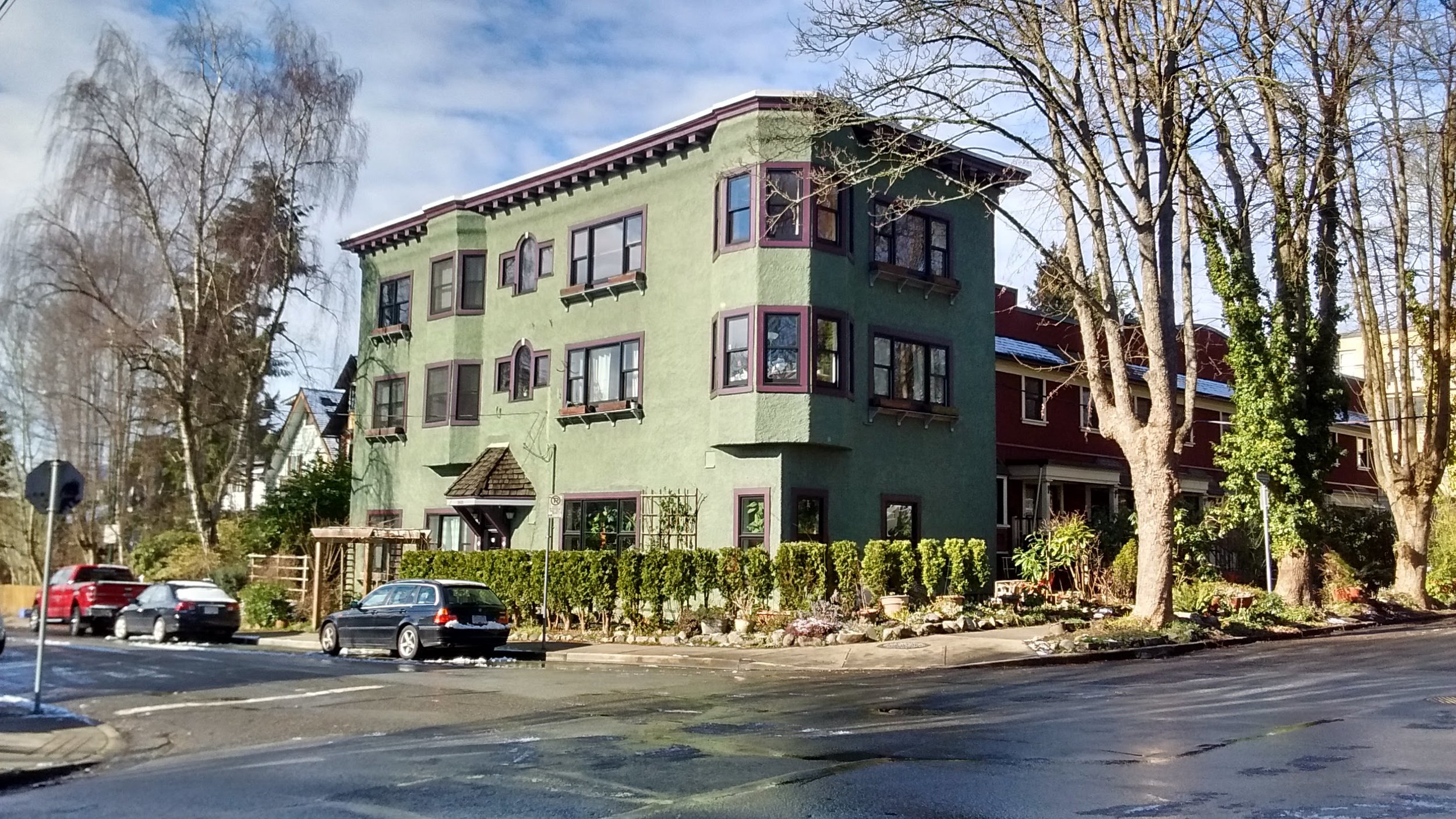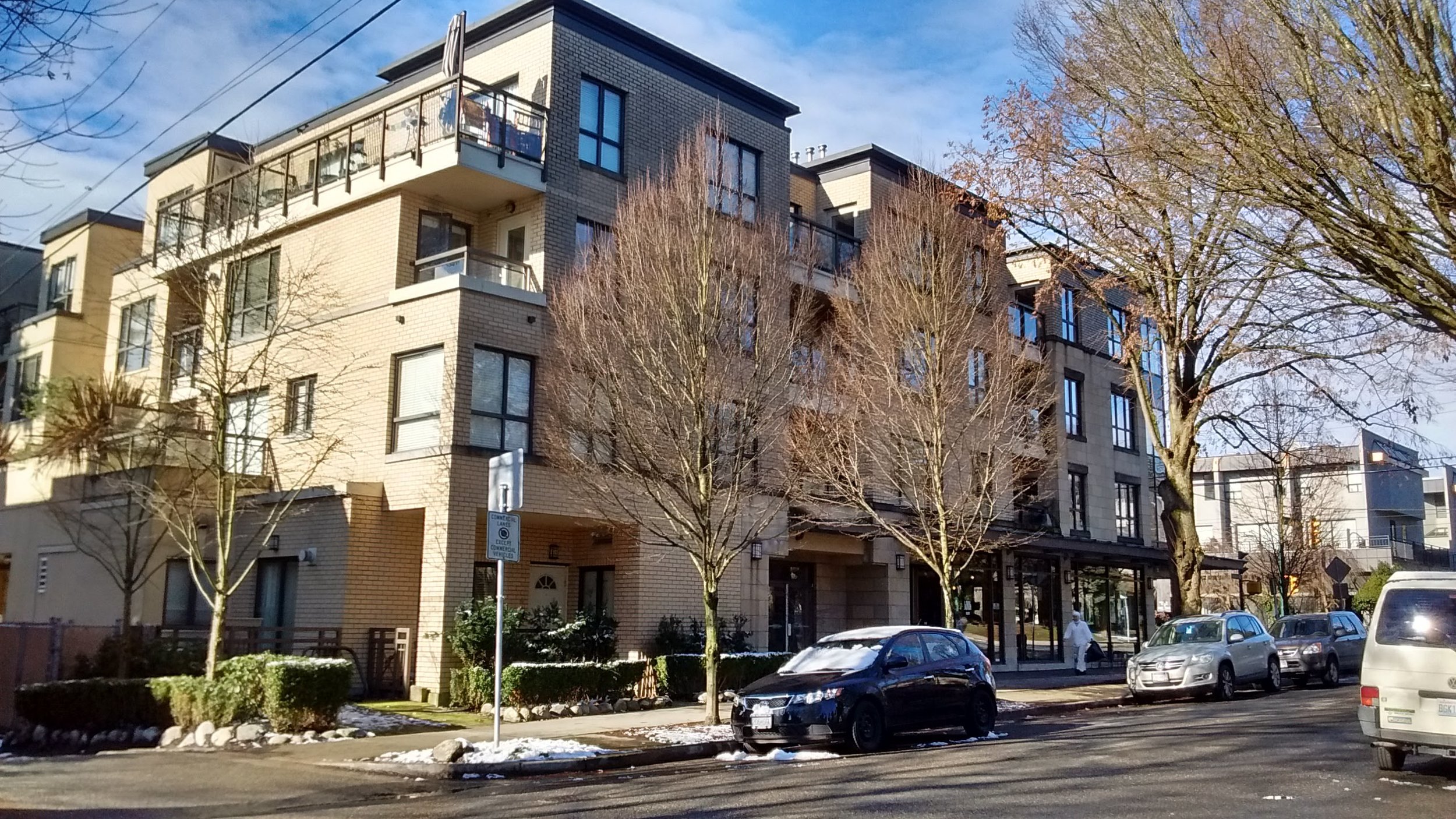A couple of nice missing middle buildings in Kits.
Radio-Canada
I got interviewed for Radio-Canada's coverage of AHV's Mount Pleasant walk this weekend. I enjoy this crew of people who care about zoning and this city that I've found. And I speak French so apparently I am useful to them.
Fin du reve de la maison unifamiliale a Vancouver, selon un groupe de residents
Published 11 February 2018
Immigrants vs. global capital flows and inclusiveness in Canada's big cities
When it comes to Vancouver's housing crisis we can all agree that there is a problem but it's harder to think of a solution. One of the problems that we all seem to be able to identify is the influence of global capital and real estate speculation on housing prices.
Some have called to ban foreign ownership. Today, BC Premier John Horgan ruled this option out saying, "British Columbia is the gateway to Canada and I don't believe we should be curbing people coming here. I'm the child of an immigrant, virtually everyone I see here is the child of an immigrant."
I'm a bit confused by this argument because global capital flows are not immigration. The problems with people from far away places buying properties they don't live in isn't the same as immigration. If I were to design a policy regulating foreign ownership I would make it so that residents, which includes immigrants would be able to buy property.
The difference between immigrants and global real estate speculation is that immigrants actually live here. They migrate to Canada. What they probably find is that Canada's two largest cities are rampantly unaffordable and that the routes to success taken by previous generations of immigrants are closed off to them.
The problem isn't immigrants, people who come and live in Canada, buying housing. It's people who don't live in Canada buying housing. It's those who wish to treat our housing markets as places to park capital and make money making it so that people who do live here can't survive.
So why are we equating immigrants and being an inclusive place with welcoming an endless free-flow of speculative global investment?
If we really want to be an inclusive place where immigrants and the children of immigrants can make it then we have to be a place where people can afford to live. Immigrants are as much a victim of the housing crisis as anyone else. Imagine how hard it is for new immigrants and refugees to build lives in Canada when the cost of housing is so out of reach. For us to be an inclusive place we need to be a place with housing people can actually afford.
So why is regulating foreign capital flows somehow pegged to being an inclusive society? It beats me. It's not possible for an airline to be majority foreign owned in Canada but our housing market is up for grabs? That doesn't make any sense.
Now, back to the children of immigrants. I know quite a few first-generation Canadians. Their parents came here for freedom or opportunity or because of the idea of this place that we project into the world. Parents dream of giving their kids a better life. Sadly, for most of my friends that life doesn't include being able to own or afford housing. I don't know a single first generation Canadian who can afford a one-bedroom condo in Vancouver. Not one. So what was Horgan saying about the children of immigrants and the promise of opportunity in Canada?
There are many models for how we can regulate foreign investment in Canada's real estate. Switzerland offers a compelling model.
Global capital flows are not immigrants. They are very different. Immigrants are people, people who actually live in Canada, people who are being crushed by the housing crisis just like the rest of us. Global capital flows are money. Until we decide that people matter more than money we will not be an inclusive place for anyone, immigrants and children of immigrants included.
I love this place but this place doesn't love me
The day before I moved back to Vancouver Jessica Barrett's why I left Vancouver piece appeared in the Tyee. One of my good friends intentionally didn't send it to me because he was worried it would upset me. I saw it on Twitter and my Father told me about it. I read it and began to question my plans for the future yet again.
I'd wanted to come back to Vancouver ever since I'd left for school in Scotland. I remembered cheaper West End apartments and my affordable but dodgy place in East Van. Finding housing was one of the big things stopping me from coming back. I was worried about getting scammed or not being able to find something.
I got lucky. A friend of a friend who I had talked to at a wedding over the summer knew someone looking for a tenant. I emailed and arrived in Vancouver with a place to live that I could almost afford. It's way more than the thirty per cent of my income that I'm supposed to be paying for housing but not so much that I can't make it each month. It'll do.
I go between being grateful for having this housing and being angry that I pay so much to live in it. I am sick of roommates. I am sick of taking what I can get. I am sick of not mattering in a system designed to screw me over.
I don't want much. I want to be comfortable. I want to pick out my own sofa and have a space where I feel comfortable and happy. I don't want to sleep in later so that I don't have to make small talk over breakfast — I have a general don't speak to me in the morning policy. I feel worn out and drained by the prospect that it will never get better than this.
The plan was to move to Vancouver and stay here, build a life in this city that I love and am drawn back to. Now I look at it as though I get four years here — I'm applying to study landscape architecture at UBC — and then I need to work out my next move. I think about moving to Halifax or Montreal. I think about how nice it would be to live somewhere where people don't have to struggle so hard to survive.
When I left Scotland I was excited to return back to Canada. It's easy being here. People understand what I say, they get my references. I can work here and I get healthcare here. It's not as good as the healthcare in Scotland but I can get it. Justin Trudeau has been elected. It was the period between Brexit and him breaking all of his promises. Things looked good.
When I leave I end up wanting to come home. When I'm home I want to leave.
I want to stay in Canada but there's also this voice telling me to go back to Northern Europe. I could move to Sweden or Norway or Amsterdam or Glasgow. I could move somewhere where I fit in better. For all the language and culture I always feel like the odd one out in Canada. I feel like my preferences and values are a much better fit in the Nordic countries than here. Things I took for granted as shared assumptions in Scotland I have to justify here. I feel like a crazy person for holding beliefs most Europeans don't think about.
All this moving has worn me out. I want to just live somewhere. I want a boring happy life. I want to buy some dishes and a couch and a table. I want to settle in. I want to do it here but I just don't feel like I can. Dying in the earthquake we're all woefully unprepared for aside Vancouver is a spectacular place to live. It's also one that doesn't seem to care whether or not people can in fact live in it, it's one that doesn't care about people living in poverty or people who are struggling.
Canada students loans offers $1500 a month. That's just about enough to cover rent near UBC in Vancouver (if you get lucky). Nothing for tuition or food or replacing things that wear out or God forbid having a life and being somewhat happy and not worrying about every last purchase you make during your youthful years.
Students inhabit this weird brand of poverty that for some reason Canadians don't consider to matter. We have no income and we have enormous expenses but yet we're not poor. We're just borrowing from the future, a future it is harder and harder to imagine having.
There are parts of Barrett's piece and her response that I take issue with. Some of her policy solutions are self-serving like her belief that if only landlords couldn't charge more for a dog that will totally damage their place then she'd be fine or that simply moving to another city solves the problem or that because we're a country of immigrants it would be wrong to stop people who will never live here from owning property here. Her solution of moving to Calgary and buying a property there simply gets her in the game before the same forces that made Vancouver and Toronto unmanageable hit. Once Calgary is unaffordable where do we run? She is not a policy wonk. She's just done.
My dad's response to my thoughts on Barrett's piece was that I am a macro policy type person and it can be cold and logical. That is true but it's also not. Policies aren't these cold and neutral things. They decide winners and losers. They decide whether or not people are homeless. They decide whether renters or rich foreign investors matter more. Those policies have huge impacts on our lives.
A great example of this was during Calgary's recent budget deliberations. Proposed cuts to transit began as a number. Then the Calgary Herald translated them into impacts.
"On Tuesday, the second day of budget deliberations, the public got its first glimpse at what bus routes will be affected if council approves a 46,800 service-hour reduction at Calgary Transit that’s estimated to affect 56,000 riders a week."
This paragraph tells us how many people's lives will be worse because of the proposed cuts.
"The proposed cuts to the 27 bus routes will affect riders in different ways, depending on the route — they include doubling wait times, changing mid-day frequency by five minutes, and cutting weekend and late-night service on some routes.
The affected routes are: 2, 7, 10, 15, 24, 25, 27, 28, 31, 34, 78, 83, 86, 89, 93, 105, 113, 114, 120, 134, 146, 174, 199, 300, 420, 453, and 456."
That might seem like a random list of numbers to you but two stand out to me: the 2 and 10. I take those buses. I know people who take those buses. Those cuts would mess up my life. I was thinking about taking the 10 to Market Mall to buy a new phone over the holidays. It's meaningful to me.
Policies are about choices. We decide who matters and who doesn't. Most of the time in Canada I feel like I don't matter. I can run away but that doesn't really solve the problem.

